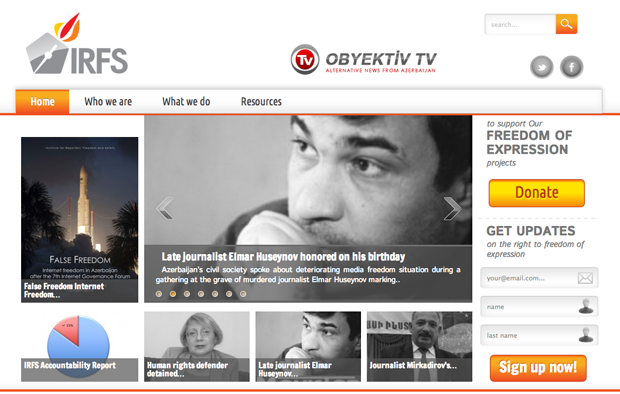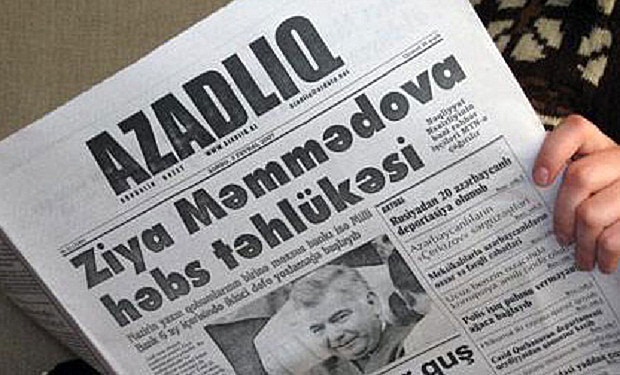Letter: Wave of repression in Azerbaijan
Mr Thorbjørn Jagland
Secretary General of the Council of Europe
67075 Strasbourg Cedex
France
Fax: +33 3 88 41 27 99
Email: [email protected]
13 August 2014
Re: Wave of repression in Azerbaijan
Dear Secretary General,
We are writing to you to express our concern and disappointment with your 11 August 2014 public statement, following your agreement with President Ilham Aliyev that a joint Committee between the Presidential Administration and representatives of the civil society, established in 2005, would be re-convened. You called this initiative “a good opportunity to go through the charges brought against the human rights defenders and to re-launch dialogue between the authorities and civil society.”
This announcement comes in the midst of an “unprecedented repression against civil society leaders in Azerbaijan.”[1]
Just in the last days many indispensible voices were indeed arrested in an attempt to silence them: a well-known and widely respected human rights defender Rasul Jafarov[2]; human rights defenders Leyla Yunus, a Chevalier of the National Order of the Legion of Honour as a tribute for her longstanding work promoting human rights; and human rights lawyer Intigam Aliyev, “a man who many refer to as ‘müəllim’, or ‘teacher’ – an honorific that in Azerbaijan bestows the utmost respect, who […] taught, educated, trained, and provided guidance to Azerbaijan’s newest generation of human rights defenders.”[3] Intigam Aliyev is also engaged as a regional tutor in the Human Rights Education for Legal Professionals (HELP) programme of the Council of Europe.
This new wave of repression comes after the sentencing on 26 May of Anar Mammadli and Bashir Suleymanli to respectively 5 years and 6 months and 3 years and 6 months imprisonment. Those two human rights defenders are the leaders of the only independent group monitoring elections in Azerbaijan. At the same time, 8 activists of NIDA, a non-governmental youth movement, were convicted on charges of hooliganism, possessing drugs and explosives as well as intent to cause public disorder. On Friday, 4 July, another NIDA activist, Ömar Mammadov was sentenced to 5 years imprisonment on charges of drug possession with the aim of selling it.
We are disappointed that you have abstained from any public comment on the charges against the human rights defenders. The Council of Europe Commissioner for Human Rights considers the charges against Rasul Jafarov and the travel ban against Emin Huseynov as “another disturbing illustration of how human rights defenders in Azerbaijan are systematically threatened with an instrumental use of criminal suits.”[4] In her statement issued on 3 August 2014,[5] the rapporteur on human rights defenders of the Parliamentary Assembly of the Council of Europe Mailis Reps denounced Leyla Yunus’ arrest and detention and expressed “concern for the true motivation underlying the charges levied against her,” calling the arrest “another example of the unrelenting suppression of independent voices and crackdown on civil society in the country. This is an unacceptable violation of Azerbaijan’s duties as a member of the Council of Europe.”
We are surprised that you did not publicly call for the release of the detained human rights defenders, at least from the pre-trial detention, which is not necessary[6] and presents a risk to the heath condition of Leyla Yunus. Intigam Aliyev and Arif Yunus also have problematic health conditions.
It is unclear to us which committee you refer to, and we understand it is in fact a working group established in 2005 on political prisoners in the country. The people, who have been over the last years working on the issue of political prisoners in the country and on core human rights issues, are now behind bars or left the country for security reasons. The civil society in Azerbaijan has grown in size and developed in professionalism in the last decade, and now includes strong voices for the promotion of human rights, such as the Institute for Reporters’ Freedom and Safety (IRFS), which was sealed whilst you spoke with President Aliyev on 11 August.[7] Who will today choose the representatives of Azerbaijani civil society in that working group?
To launch a dialogue platform in these conditions and without first step by the government, meaning the unconditional and immediate release of human rights defenders, will at best be ephemeral, and might possibly be counterproductive. How will this group operate without the key professional and defenders who are now jailed or detained? There is no need to “go through the charges brought against the human rights defenders”; they just need to be dropped because they are unfounded and unfair, and indeed based on laws, which de facto criminalise the work of human rights defenders. As Secretary General, you indeed give the impression that you endorse policies by which governments can choose their civil society, fostering it with support for loyal voices and repression for critical voices, contrary to the values embodied by the Council of Europe.
Those persecuted and arrested human rights defenders in Azerbaijan are also the ones, which inform and cooperate with institutions of the Council of Europe, including yourself. They have international recognition and wide outreach. In June 2014, when President Aliyev addressed the Parliamentary Assembly of the Council of Europe, Emin Huseynov, Rasul Jafarov and Intigam Aliyev together organised a side-event in Strasbourg, critical of the Azerbaijani human rights record. This wave of repression is related to Azerbaijan’s chairmanship of the Council of Europe and indeed a reprisal against critical voices cooperating with and reporting to the Council of Europe mechanisms.
This reprisal did not start recently but started with the order to the Human Rights House Azerbaijan to cease its activities in March 2011, following an event organised by HRH Azerbaijan at the Parliamentary Assembly of the Council of Europe in January 2011.[8]
We believe that your role is to protect and defend Council of Europe institutions, including those cooperating with them. We therefore regret that you have not chosen to use your influence and the power of your office to call for immediate and unconditional release of those human rights defenders and have not condemned their arrest.
As said by the Commissioner in the statement quoted above “by stifling dissent, Azerbaijan is failing to comply with its international obligations which require safeguarding freedom of expression, assembly and association. It is necessary that Azerbaijan reverse the situation. A first step would be to free all those detained because of the views they expressed.”
Sincerely,
Jodie Ginsburg Florian Irminger Adela Pospichalovaon
Index on Censorship Human Rights House Foundation People in Need
For correspondence:
Florian Irminger
Head of Advocacy and HRHF’s Geneva Office
Human Rights House Foundation (HRHF)
Rue de Varembé 1, PO Box 35
1211 Geneva 20
Tel: +41 22 33 22 552
Fax: +41 22 33 22 559
Email: [email protected]
[1] Human Rights House Foundation’s press release of 9 August 2014, available at http://humanrightshouse.org/Articles/20335.html.
[2] More information on that case available at http://humanrightshouse.org/Articles/20306.html.
[3]Article about Intigam Aliyev’s arrest by Giorgi Gogia, Senior Researcher at Human Rights Watch, available at http://www.hrw.org/news/2014/08/08/dispatches-azerbaijan-jails-yet-another-rights-defender.
[4] Council of Europe Commissioner for Human Rights statement of 7 August 2014, available at http://tinyurl.com/qh6snqc.
[5] Mailis Reps’ statement is available at http://assembly.coe.int/nw/xml/News/News-View-EN.asp?newsid=5153&lang=2&cat=5.
[6] Human rights defenders have been facing travel bans and hence, cannot leave the country, despite the fact that they do not present any risk to society if not detained. Conditions making a pre-trial detention necessary are hence not fulfilled, abiding by article 5 of the Convention for the Protection of Human Rights and Fundamental Freedoms.
[7] The visible persecution of IRFS and its leader began on 8 August with a search of its offices. More information available at http://www.indexoncensorship.org/2014/08/azerbaijan-press-freedom-arrest-free-expression-baku/.
[8] More information on the situation of the Human Rights House Azerbaijan available at http://humanrightshouse.org/Articles/20037.html.


